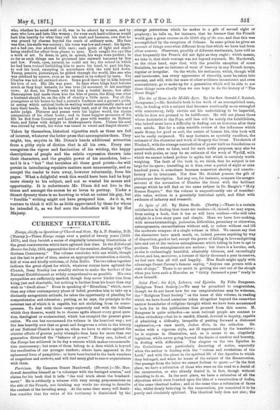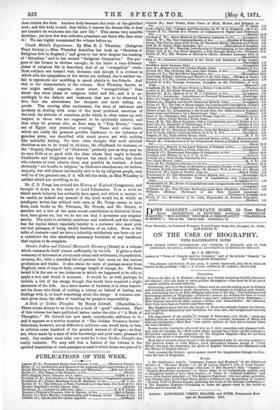Saint Paul : his Life, Labours, and Epistles. By Ftilix
Bungener. (Religious Tract Society.)—We may be permitted to congratulate, though we do not know how far our congratulations may be welcome, the "Religious Tract Society" on the issue of this volume, in reading which we have found ourselves taken altogether beyond the somewhat narrow boundaries of religious thought which we have been accustomed to look for in the publications that proceed from this source. M. Bungenor is quite orthodox—as most rational people are content to define orthodoxy—but he is candid, liberal, devoted to inquiry, capable of admitting a difficulty, incapable of putting forward a dishonest explanation,—a rare merit, fcedum dicta, in the orthodox. He writes with a vigorous style, not ill represented by the translator ; he is copious in illustration, and, as it seems to us, singularly ingenious, while never going beyond the limits of candour and honesty, in dealing with difficulties. The chapter on the two Epistles to the Corinthians are particularly deserving of notice, especially when the author is dealing with the "visions and revelations of tho Lord," and with the phase in the spiritual life of the Apostles to which they belonged, and when he treats of the subject of the Resurrection. One passage from the latter we cannot forbear to quote :—" In the first place, we have a refutation of those who were on the road to a denial of the resurrection, or who already denied it, in fact, though without intending to do so. In the next place, we have a refutation of all the objections which were founded upon the idea of a resurrection of bodies, of the same identical bodies ; and at the same time a refutation of those who, whilst firmly believing in the resurrection, yet conceived it to be parely and absolutely spiritual. The identical body does not rise; the
dust retains the dust. Another body becomes the home of the glorified soul ; and this body is such that whilst it renews the former life, it does nob transfer its weakness into the new life." This seems very sensible doctrine ; yet how few free orthodox preachers are there who dare utter it ! We can highly recommend the volume before us.

































 Previous page
Previous page